Strategic Human Resource Management: HSBC Policies and Impact Analysis
VerifiedAdded on 2020/07/22
|5
|712
|50
Report
AI Summary
This report examines the strategic human resource management (HRM) policies, specifically focusing on the impact of regulatory requirements and organizational culture within HSBC. It analyzes the influence of regulations like the National Minimum Wages Act and the Equal Pay Act on HRM practices, emphasizing the importance of compliance for fostering a positive work environment. Furthermore, the report explores the impact of organizational culture, such as power culture, on HRM, highlighting how it shapes employee training, values, and ethical practices. The analysis references various academic sources to support its findings, providing a comprehensive overview of how these factors affect HRM within the organization and contribute to its overall success.
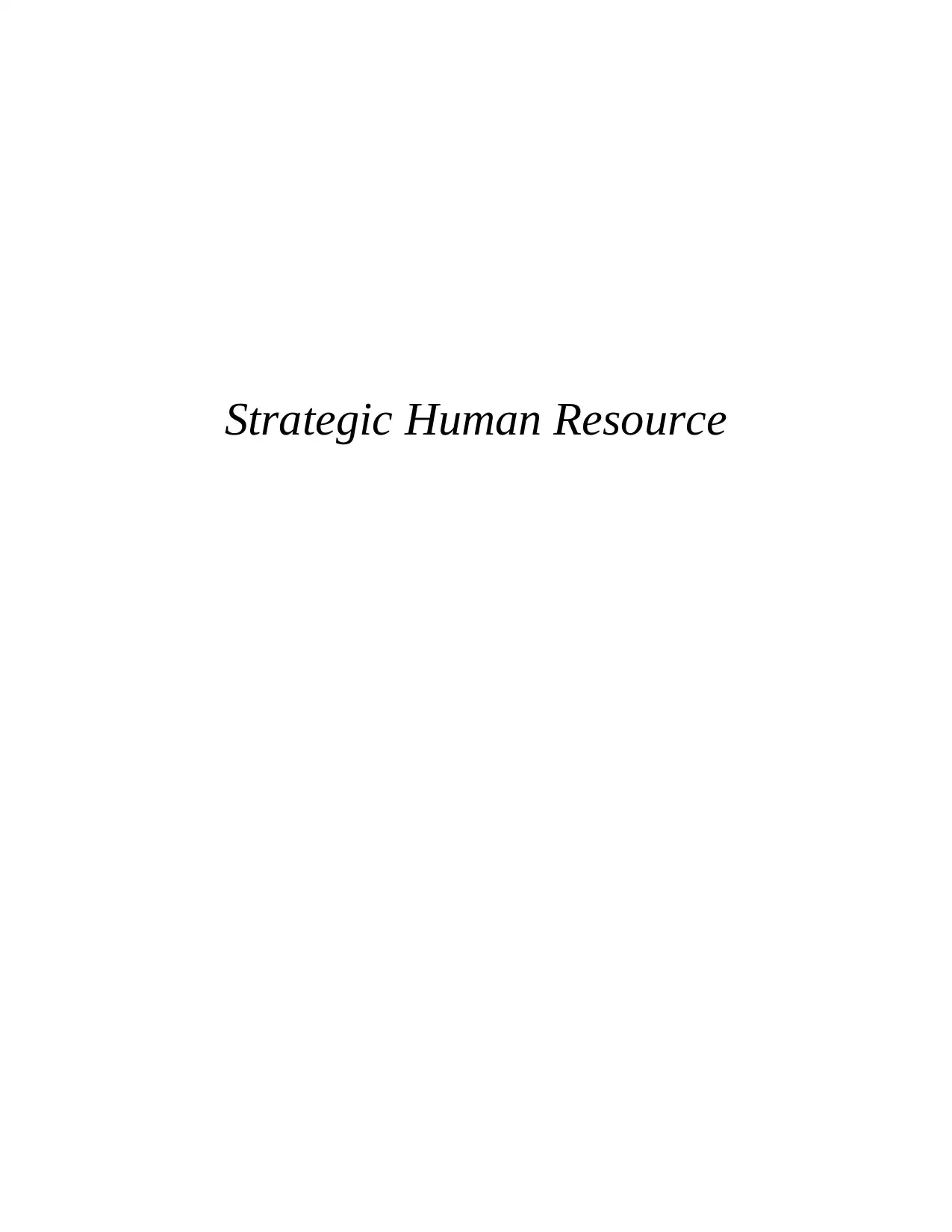
Strategic Human Resource
Paraphrase This Document
Need a fresh take? Get an instant paraphrase of this document with our AI Paraphraser
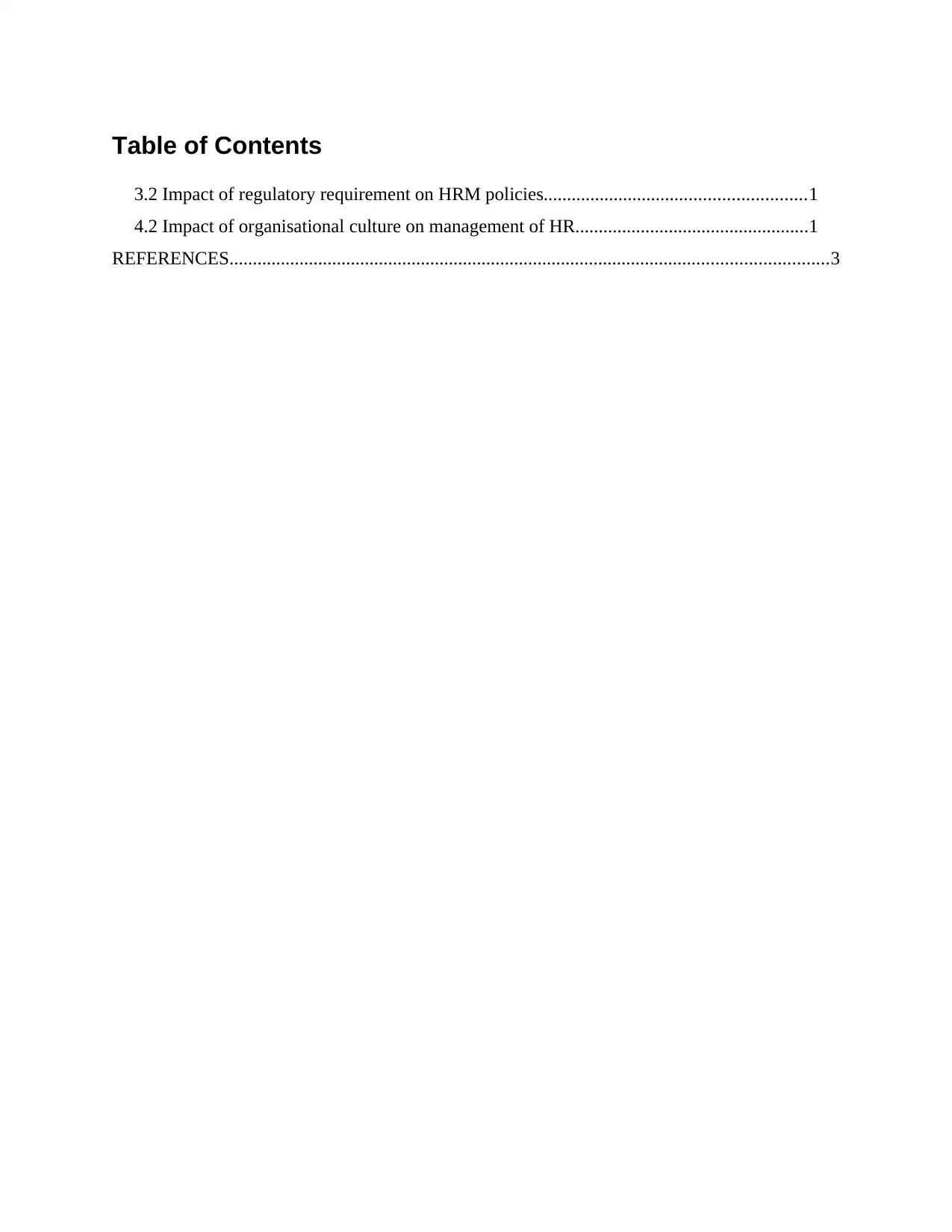
Table of Contents
3.2 Impact of regulatory requirement on HRM policies........................................................1
4.2 Impact of organisational culture on management of HR..................................................1
REFERENCES................................................................................................................................3
3.2 Impact of regulatory requirement on HRM policies........................................................1
4.2 Impact of organisational culture on management of HR..................................................1
REFERENCES................................................................................................................................3
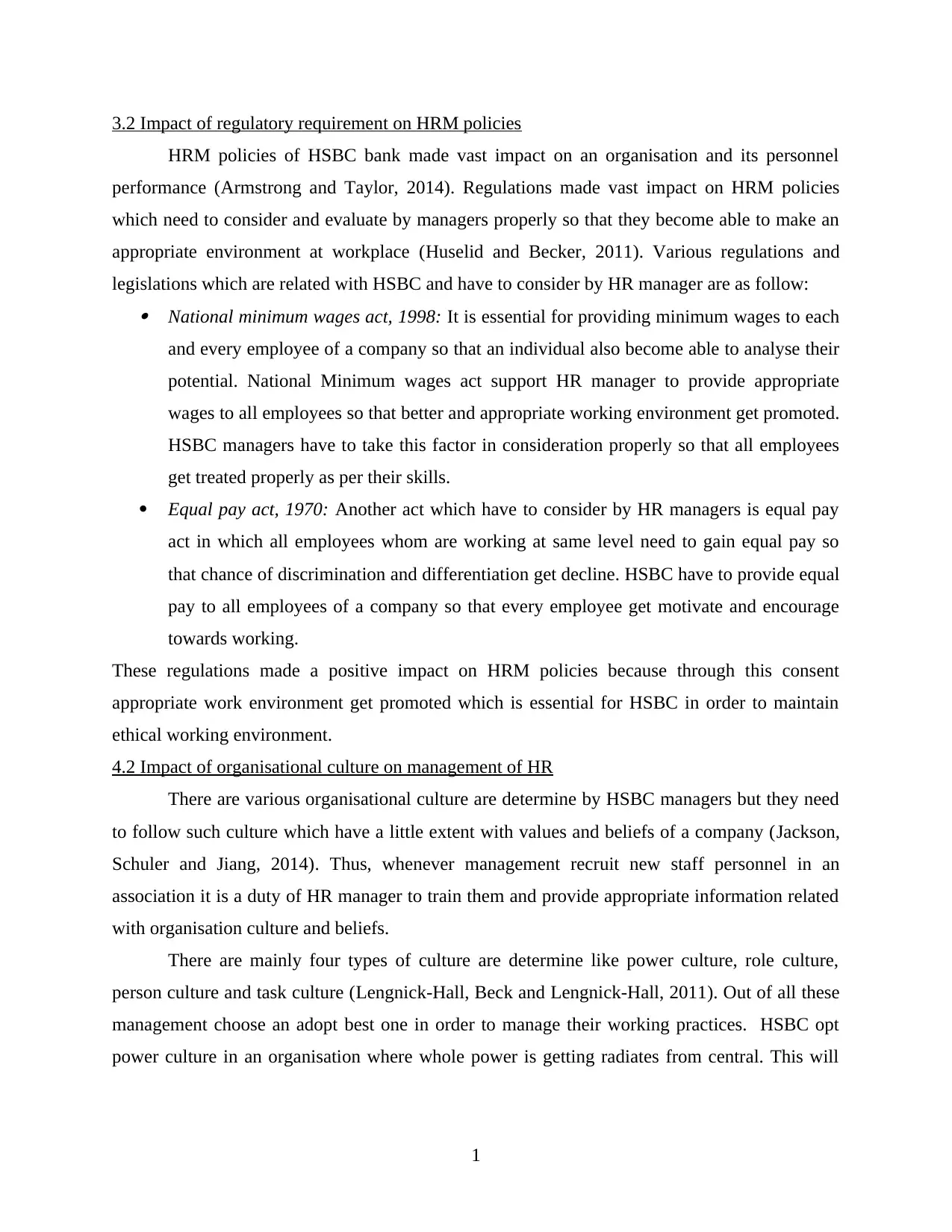
3.2 Impact of regulatory requirement on HRM policies
HRM policies of HSBC bank made vast impact on an organisation and its personnel
performance (Armstrong and Taylor, 2014). Regulations made vast impact on HRM policies
which need to consider and evaluate by managers properly so that they become able to make an
appropriate environment at workplace (Huselid and Becker, 2011). Various regulations and
legislations which are related with HSBC and have to consider by HR manager are as follow: National minimum wages act, 1998: It is essential for providing minimum wages to each
and every employee of a company so that an individual also become able to analyse their
potential. National Minimum wages act support HR manager to provide appropriate
wages to all employees so that better and appropriate working environment get promoted.
HSBC managers have to take this factor in consideration properly so that all employees
get treated properly as per their skills.
Equal pay act, 1970: Another act which have to consider by HR managers is equal pay
act in which all employees whom are working at same level need to gain equal pay so
that chance of discrimination and differentiation get decline. HSBC have to provide equal
pay to all employees of a company so that every employee get motivate and encourage
towards working.
These regulations made a positive impact on HRM policies because through this consent
appropriate work environment get promoted which is essential for HSBC in order to maintain
ethical working environment.
4.2 Impact of organisational culture on management of HR
There are various organisational culture are determine by HSBC managers but they need
to follow such culture which have a little extent with values and beliefs of a company (Jackson,
Schuler and Jiang, 2014). Thus, whenever management recruit new staff personnel in an
association it is a duty of HR manager to train them and provide appropriate information related
with organisation culture and beliefs.
There are mainly four types of culture are determine like power culture, role culture,
person culture and task culture (Lengnick-Hall, Beck and Lengnick-Hall, 2011). Out of all these
management choose an adopt best one in order to manage their working practices. HSBC opt
power culture in an organisation where whole power is getting radiates from central. This will
1
HRM policies of HSBC bank made vast impact on an organisation and its personnel
performance (Armstrong and Taylor, 2014). Regulations made vast impact on HRM policies
which need to consider and evaluate by managers properly so that they become able to make an
appropriate environment at workplace (Huselid and Becker, 2011). Various regulations and
legislations which are related with HSBC and have to consider by HR manager are as follow: National minimum wages act, 1998: It is essential for providing minimum wages to each
and every employee of a company so that an individual also become able to analyse their
potential. National Minimum wages act support HR manager to provide appropriate
wages to all employees so that better and appropriate working environment get promoted.
HSBC managers have to take this factor in consideration properly so that all employees
get treated properly as per their skills.
Equal pay act, 1970: Another act which have to consider by HR managers is equal pay
act in which all employees whom are working at same level need to gain equal pay so
that chance of discrimination and differentiation get decline. HSBC have to provide equal
pay to all employees of a company so that every employee get motivate and encourage
towards working.
These regulations made a positive impact on HRM policies because through this consent
appropriate work environment get promoted which is essential for HSBC in order to maintain
ethical working environment.
4.2 Impact of organisational culture on management of HR
There are various organisational culture are determine by HSBC managers but they need
to follow such culture which have a little extent with values and beliefs of a company (Jackson,
Schuler and Jiang, 2014). Thus, whenever management recruit new staff personnel in an
association it is a duty of HR manager to train them and provide appropriate information related
with organisation culture and beliefs.
There are mainly four types of culture are determine like power culture, role culture,
person culture and task culture (Lengnick-Hall, Beck and Lengnick-Hall, 2011). Out of all these
management choose an adopt best one in order to manage their working practices. HSBC opt
power culture in an organisation where whole power is getting radiates from central. This will
1
⊘ This is a preview!⊘
Do you want full access?
Subscribe today to unlock all pages.

Trusted by 1+ million students worldwide
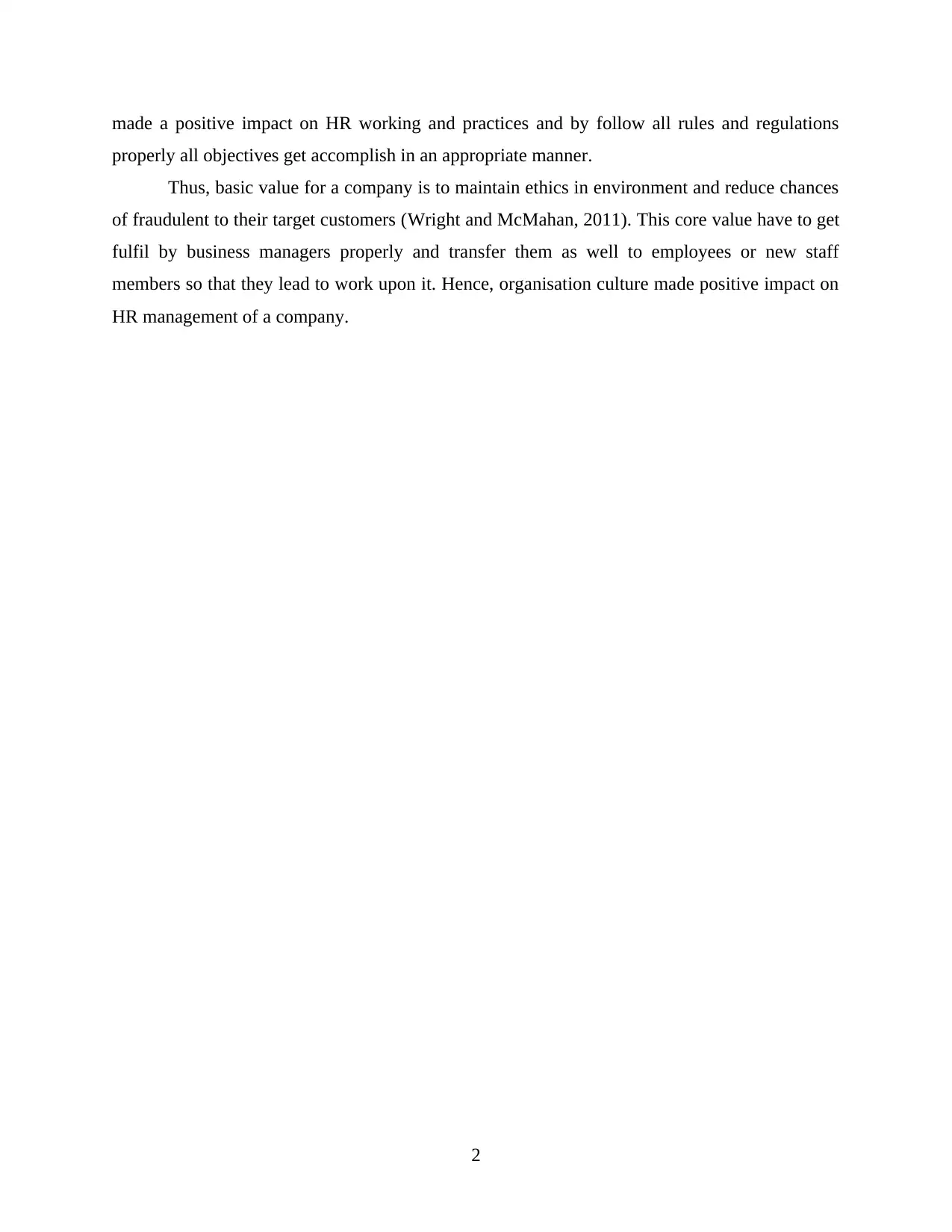
made a positive impact on HR working and practices and by follow all rules and regulations
properly all objectives get accomplish in an appropriate manner.
Thus, basic value for a company is to maintain ethics in environment and reduce chances
of fraudulent to their target customers (Wright and McMahan, 2011). This core value have to get
fulfil by business managers properly and transfer them as well to employees or new staff
members so that they lead to work upon it. Hence, organisation culture made positive impact on
HR management of a company.
2
properly all objectives get accomplish in an appropriate manner.
Thus, basic value for a company is to maintain ethics in environment and reduce chances
of fraudulent to their target customers (Wright and McMahan, 2011). This core value have to get
fulfil by business managers properly and transfer them as well to employees or new staff
members so that they lead to work upon it. Hence, organisation culture made positive impact on
HR management of a company.
2
Paraphrase This Document
Need a fresh take? Get an instant paraphrase of this document with our AI Paraphraser
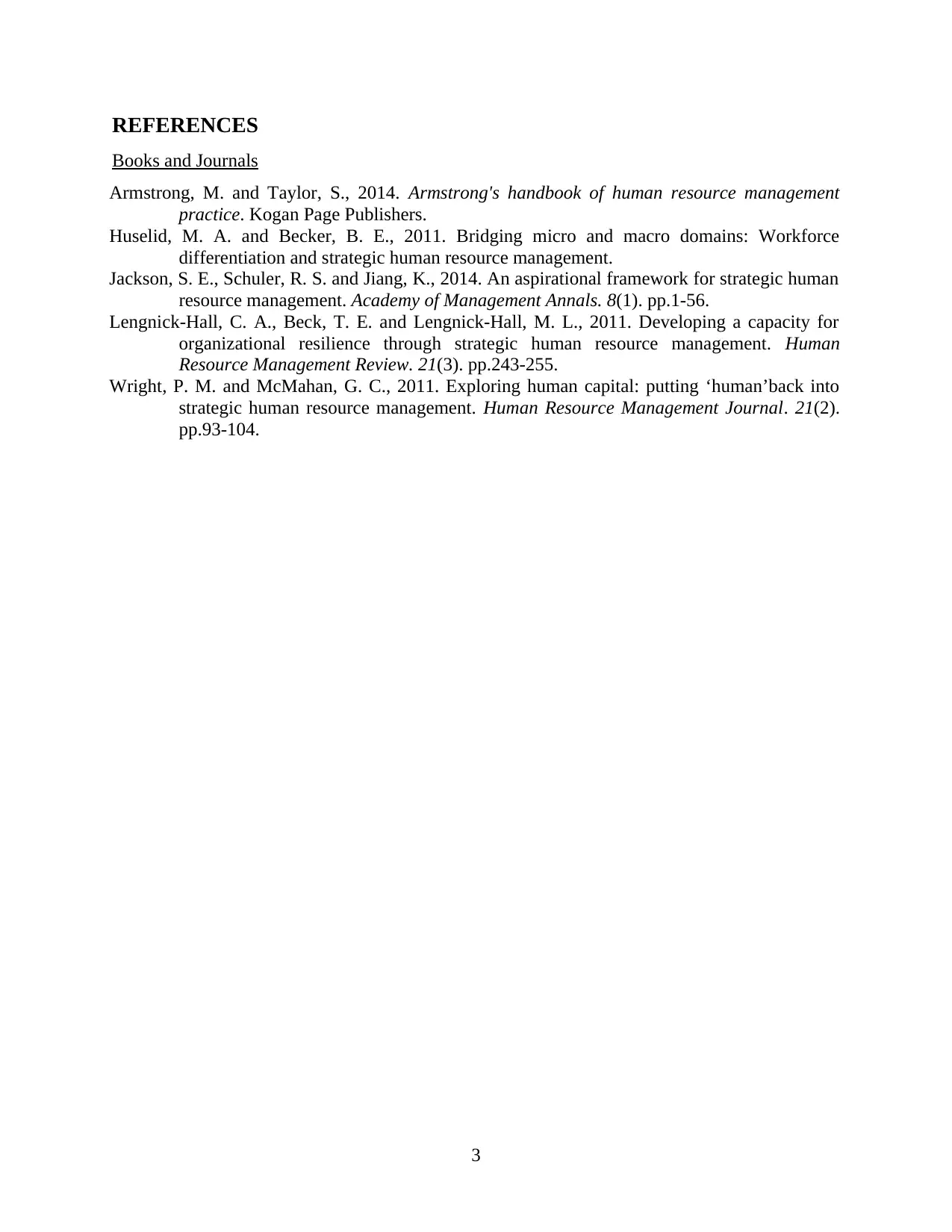
REFERENCES
Books and Journals
Armstrong, M. and Taylor, S., 2014. Armstrong's handbook of human resource management
practice. Kogan Page Publishers.
Huselid, M. A. and Becker, B. E., 2011. Bridging micro and macro domains: Workforce
differentiation and strategic human resource management.
Jackson, S. E., Schuler, R. S. and Jiang, K., 2014. An aspirational framework for strategic human
resource management. Academy of Management Annals. 8(1). pp.1-56.
Lengnick-Hall, C. A., Beck, T. E. and Lengnick-Hall, M. L., 2011. Developing a capacity for
organizational resilience through strategic human resource management. Human
Resource Management Review. 21(3). pp.243-255.
Wright, P. M. and McMahan, G. C., 2011. Exploring human capital: putting ‘human’back into
strategic human resource management. Human Resource Management Journal. 21(2).
pp.93-104.
3
Books and Journals
Armstrong, M. and Taylor, S., 2014. Armstrong's handbook of human resource management
practice. Kogan Page Publishers.
Huselid, M. A. and Becker, B. E., 2011. Bridging micro and macro domains: Workforce
differentiation and strategic human resource management.
Jackson, S. E., Schuler, R. S. and Jiang, K., 2014. An aspirational framework for strategic human
resource management. Academy of Management Annals. 8(1). pp.1-56.
Lengnick-Hall, C. A., Beck, T. E. and Lengnick-Hall, M. L., 2011. Developing a capacity for
organizational resilience through strategic human resource management. Human
Resource Management Review. 21(3). pp.243-255.
Wright, P. M. and McMahan, G. C., 2011. Exploring human capital: putting ‘human’back into
strategic human resource management. Human Resource Management Journal. 21(2).
pp.93-104.
3
1 out of 5
Related Documents
Your All-in-One AI-Powered Toolkit for Academic Success.
+13062052269
info@desklib.com
Available 24*7 on WhatsApp / Email
![[object Object]](/_next/static/media/star-bottom.7253800d.svg)
Unlock your academic potential
Copyright © 2020–2026 A2Z Services. All Rights Reserved. Developed and managed by ZUCOL.





